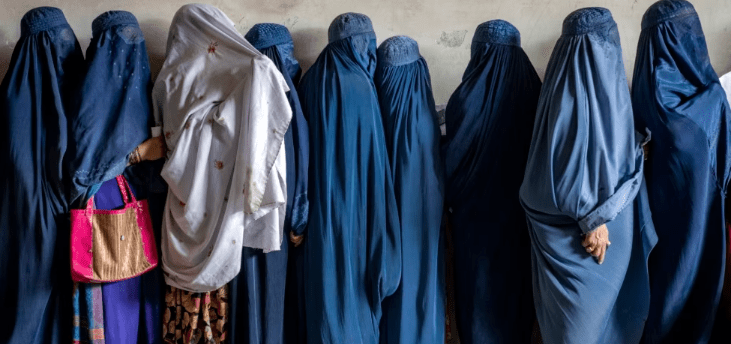
Afghanistan’s Taliban government denounced the United States Saturday for imposing fresh sanctions against two of its leaders for human rights abuses, saying that pressure and restrictive measures do not help solve problems.
The response came a day after the U.S. Treasury Department placed sanctions against 20 people in nine countries, including China, Iran and Taliban-ruled Afghanistan, to mark International Human Rights Day on December 10.
Friday’s Afghan-related designations listed Mohammad Khalid Hanafi, head of the Taliban’s vice and virtue ministry, and Fariduddin Mahmood, a member of the group’s male-only cabinet and the head of the Afghanistan Academy of Sciences.
The U.S. said the two Taliban men were responsible for “the repression of rights for women and girls based solely on their gender.”
The Taliban ban girls from receiving an education beyond the sixth grade in Afghanistan and women from most workplaces. The Islamist group reclaimed power from an American-backed government two years ago, declaring its male-only administration as the Islamic Emirate of Afghanistan, or IEA.
“We condemn the restrictions imposed by the U.S. Department of the Treasury on IEA’s two officials,” Zabihullah Mujahid, the chief Taliban spokesman, said in an English-language statement on social media platform X, formerly known as Twitter.
He urged Washington to desist from “imposing pressure and restrictions” on his government, alleging the United States “should not repeat its failed experiences” of the past.
“While America itself is among the biggest violators of human rights due to its support for Israel, it is unjustified and illogical to accuse other people of violating human rights and then ban them,” Mujahid said.
Education bans
The U.S. announcement Friday identified Mahmood as a supporter of the education-related bans on women and girls. It said that members of Hanafi’s ministry “have engaged in serious human rights abuse, including abductions, whippings and beatings.” They also have assaulted Afghans protesting the restrictions on women’s activity, including access to education, the statement noted.
“Khalid Hanafi and Fariduddin Mahmood are complicit in serious human rights abuses against women and girls in #Afghanistan. We hold them accountable for denying half the #Afghan population their rights,” Karen Decker, the chargé d’affaires of the U.S. diplomatic mission to Afghanistan, said Saturday on X.
The Taliban returned to power in August 2021 when the U.S.-led international forces withdrew from Afghanistan after two decades of involvement in the war with the then-insurgent Taliban.
“Since August 2021, the Taliban has implemented expansive policies of targeted discrimination against women and girls that impede their enjoyment of a wide range of rights, including those related to education, employment, peaceful assembly and movement, among others,” said the U.S. Treasury’s Office of Foreign Assets Control in its Friday statement.
It added that the Taliban’s restrictions have turned Afghanistan into the world’s only nation where women and girls are prohibited from pursuing secondary education.
Friday’s sanctions freeze all property and interests of the designated people in the United States and prohibit them from conducting business with Americans.
De facto Taliban rulers defend their policies, saying they are aligned with Afghan culture and Islamic law. Scholars and governments across the rest of Muslim-majority countries, however, dispute their claims.
No foreign government has recognized the Taliban as legitimate rulers of the country, mainly over human rights concerns and their harsh treatment of Afghan women.






